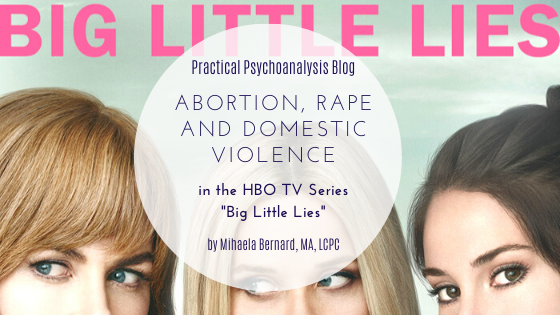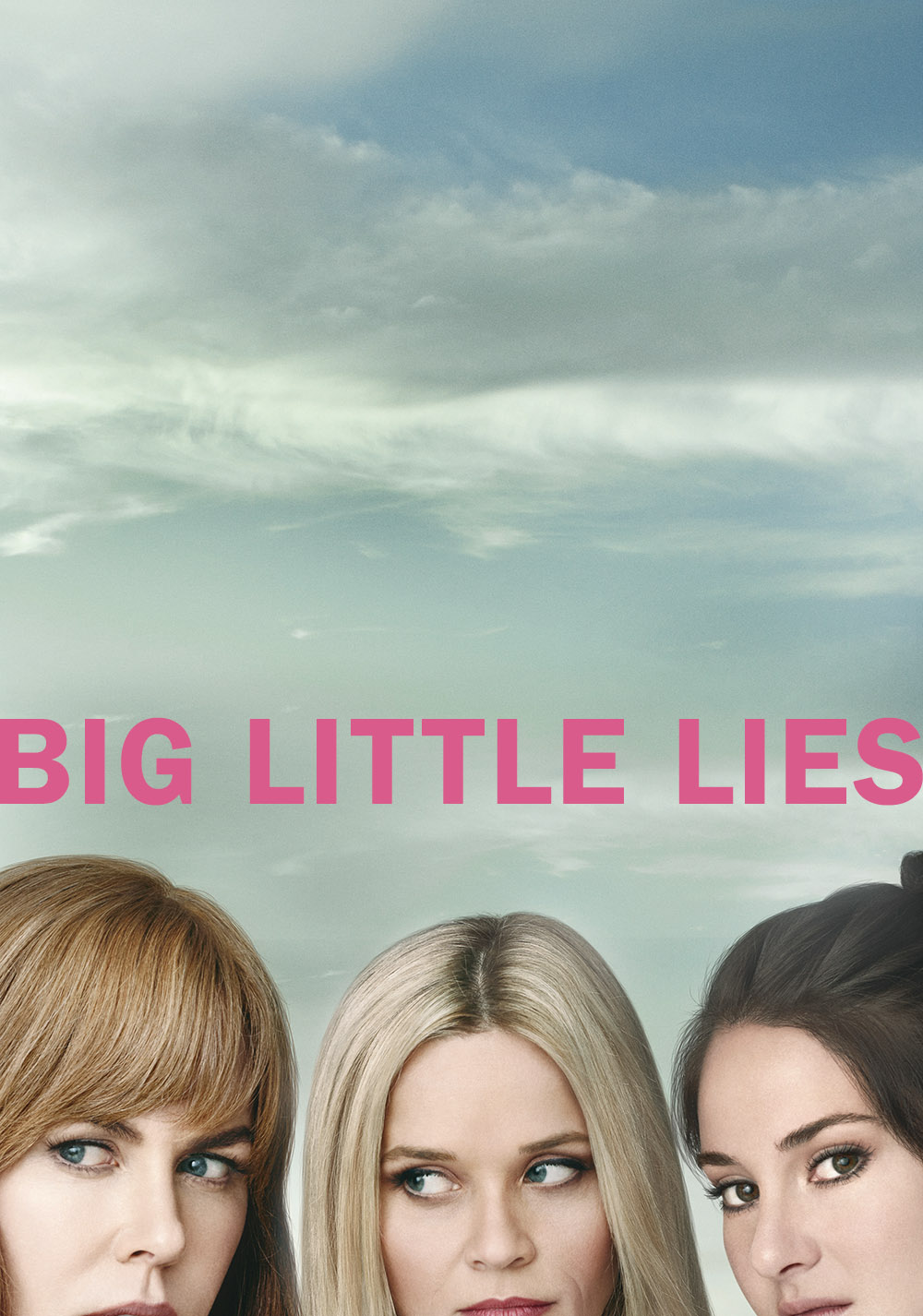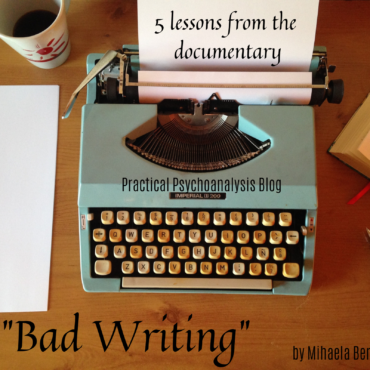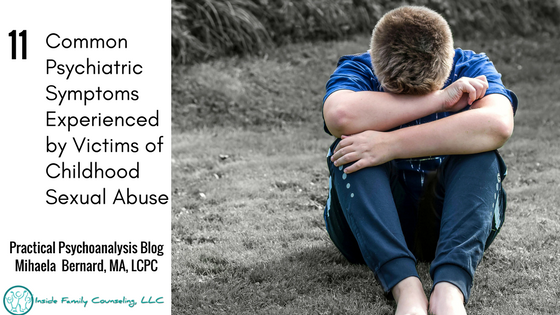I am on my way to the Annual Training in Lacanian Psychoanalysis in Quebec City, Canada, lead by the teaching analysts at the Freudian School of Quebec. I have a copy of “Big Little Lies” in my carry-on and my memories from watching the HBO Series last summer. The topics of the feminine, the masculine, women and motherhood have been recurring issues that the School has examined, along with the main topics discussed such as “Transference and Symptom” for this year’s Clinical Case Seminar. This gives you context for my frame of mind when we talk about “Big Little Lies,” abortion and domestic violence.
Abortion has been a central issue in the media in the United States in the past few weeks. More specifically, banning it in some states, regardless of circumstances such as rape or incest. The question of pro life or pro abortion is a very interesting cultural phenomenon and people are highly polarized on the issue. My goal here is not to convince you to think one way or another because my guess is, you already have a firm opinion on the topic. Instead, in this blog post, I am going to explore the topic of a child being born to rape as well as the issue of control over women and their bodies in cases of domestic violence and rape as depicted in the HBO TV Series “Big Little Lies.” As always, I am going to look at these questions from a psychoanalytic point of view (as much as we can do this without an actual patient on the couch) and offer you a way of thinking about how society and culture attempt to control something within us that is uncontrollable.
From a psychoanalytic perspective, the idea that An Other can say what a woman can or cannot do with her body is related to other issues such as sexuality, motherhood, the feminine and the sexual montage in a particular culture. In “Big Little Lies” we are confronted with the stories of three women, who struggle with the constraints of the cultural expectations and subjugation of women. Each woman in her own right is faced with the question of “What does it mean to be a woman and a mother?”
Jane, played by Shailene Woodley, feels like an outcast in a wealthy suburb in California until she is taken under the wing of Madeline, played by Reese Witherspoon, a stay-at-home mother of two, who is struggling with her marriage and her romantic connection to her husband. Jane has a son, who becomes the scapegoat for physical aggression towards girls at his school, a likely target as the new kid in town, born to a single mother. As the story develops and we learn more about Jane’s history, we come to find out that her son is actually the product of a rape that Jane experienced as an adult woman.
Jane’s character and her son’s storyline is the primary reason why I am even mentioning the issue of abortion in this blog post. It is admirable that Jane chose to have the baby after the rape. I would imagine that to have a child that is a living and breathing reminder of a terrible thing that happened to you would be quite a challenge. Jane has managed to reverse this painful sentence into a coping mechanism – her son gives her a sense of new meaning and purpose in life and being his mother makes her a stronger woman. Yet, she is terrified of what he might become, considering his conception and who his biological father is. The story juxtaposes Jane’s son, who comes from a single-parent household and is the product of rape to that of Celeste’s two boys, raised in a seemingly “perfect” and traditional household with a father figure in sight.
Celeste, Nicole Kidman, is a mother of two boys and “happily” married, but the sexual quirks of her husband quickly escalate into classic case of domestic abuse. Celeste and her husband would fight, then the fight would turn into sex, leaving Celeste with a bruised neck and a bruised sense of self, and would deepen her confusion about her own sexual relationship to her husband. She has convinced herself that the domineering nature of her partner is exciting and erotic but as she becomes more independent from the grip of her man and starts applying herself as a kick-ass lawyer, his passion becomes outright violence and she starts to question her marriage and the impact this “love relationship” has had on her two boys.
Ironically, as we follow the progression of the children in the film, we come to learn that Jane’s son and Celeste’s boys share the same biological father. I say biological because that’s all the boys share – DNA. The father function that Celeste’s husband serves for his sons and the lack of physical father for Jane’s son play important roles here. We see the difference between what in Lacanian Psychoanalysis we call the Symbolic Father and the Imaginary Father. In the book, Jane’s mother managed to speak about Ziggy in a way that she relates to her own husband and Jane’s father, thus giving him a symbolic father to identify with.
Celeste’s boys, on the other hand, reenact what they have experienced in their household but was never spoken about – their father likes to choke their mother and so the boys act out aggressively at school, leaving marks on girl’s necks at school, scaring them into silence with their popularity. From a psychoanalytic point of view, what is not spoken about or has not “passed through the signifier” will make itself known through an act. In this case, what Celeste and her husband have not spoken about is passing through the twin’s violent act in an unconscious identification with their father – choking a little girl.
There seems to be a certain difficulty for Celeste’s husband to live with his wife and her own desire as a subject. We see in the show that she is actually a pretty articulate and successful lawyer, which he feels threatened by. This fear in him seems to transform itself into violence against women and we see him subjugate his own wife as well as Jane to rape. He is unable to let himself plunge into the arms of a woman and experience her as such so he feels an urge or a push to hurt them (women) instead. We don’t know anything about his history so we cannot say much about why he is the way he is. But what he is grappling with is an experience that every man (and potentially woman) needs to learn to live with and hopefully, make an ethical choice in managing what gets triggered within him or her when s/he is faced with a/n (another) woman – the encounter with the feminine and the experience of what we call feminine jouissance in her body, which has nothing to do with having sex with her.
Here, Jane’s choice to have the child despite how it was conceived touches on something quite beautiful – the ultimate opposition to the act of rape and violence – the creation of life and the bringing into the world of another human being.
And yet, this is a fictional story that also leads to murder…
I am staying tuned for Season 2 as I am finishing up the book. Please, share your thoughts on the topics raised in the comment section.









